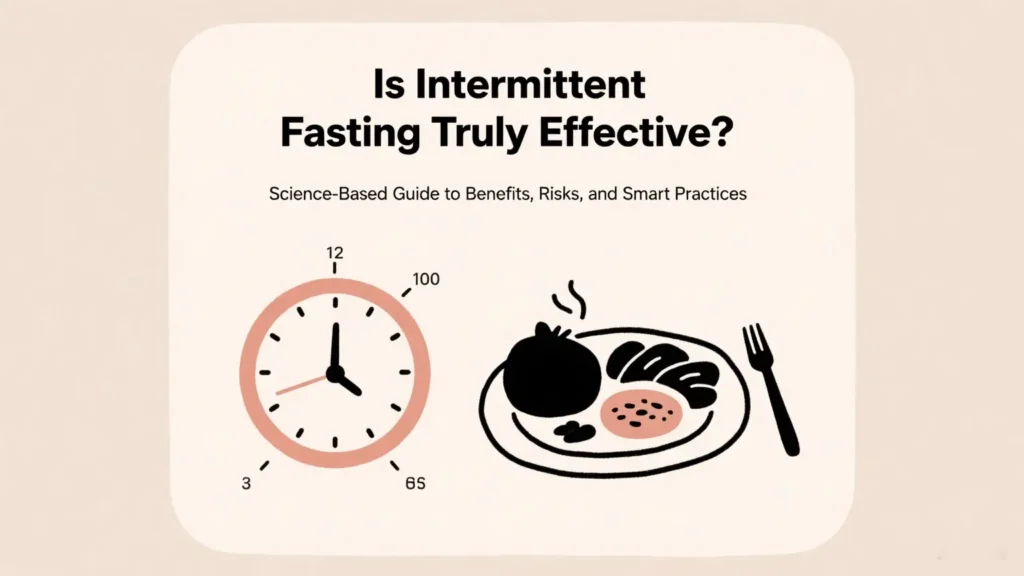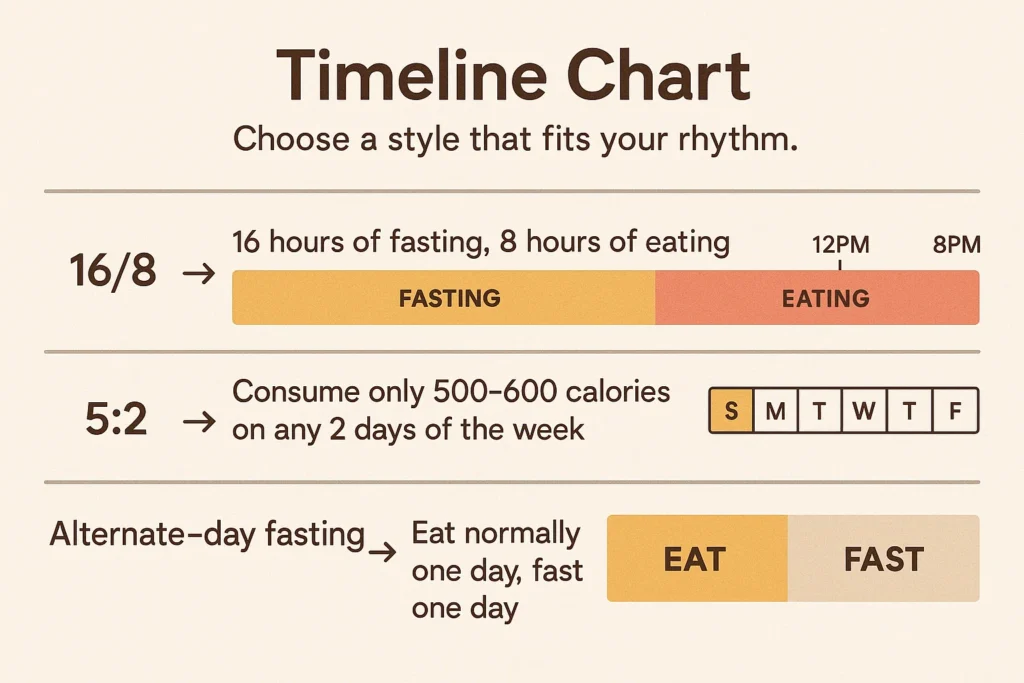One of the fads in the realm of diet that keeps changing constantly, intermittent fasting is a trend that no one can ignore nowadays. This has been met with criticism by some that consider intermittent fasting as the fad that will work for numerous people while others are skeptical about this approach of curtailing hunger as generally working. What are the aspects of intermittent fasting that set it apart from mainstream diet techniques and is any of the promised benefits doable?
We will now look into the subject matter of science, its positives, and usability regarding intermittent fasting to see its real value.

What is Intermittent Fasting?
Intermittent fasting (IF) refers to a dietary regimen that switches between fasting and consuming food. While customary solutions focus on the kind of food you consume, intermittent fasting is more concerned with the time aspect of eating.
The most popular methods are:
- 16/8 Method: Fast for 16 hours, eat during an 8-hour window
- 5:2 Diet: Eat normally for five days, restrict calories to 500–600 on two non-consecutive days
- Alternate-Day Fasting: Rotate between fasting and eating days
The approach is geared to attract the people who like keeping their diet simple, losing weight without monitoring every meal, and still gaining metabolic benefits.

Intermittent Fasting: The Science
Various investigations have dealt with the issue of how intermittent fasting affects the body. These are the findings:
- Insulin Sensitivity: Fasting makes your insulin levels go down, hence, it may be easier for your body to consume the fat you have and keep your blood sugar under control.
- Cell Reproduction: Fasting activates the process of autophagy that removes damaged cells and facilitates cellular reconstruction.
- Endocrine System Harmony: Fasting can trigger norepinephrine production which may be linked to an increase in basal metabolic rate.
- Energy Control: The fact that the eating window is shorter in the majority of cases naturally forces people to eat fewer calories and they end up being in a calorie deficit.
- Albeit, these results are more or less applicable in general, certain variables like lifestyle, age, gender, and continuity should also be taken into consideration.
Intermittent Fasting vs. Traditional Diets (Text Version)
In what follows, let’s contrast the intermittent fasting approach with the traditional calorie-controlled diets to highlight the contrast in methods of implementation, effectiveness and sustainability:
Eating Schedule:
- Intermittent fasting is based on specific eating time periods, for instance, it may be defined as eating between the hours of 12 noon and 8 in the evening only.
- Conversely, in traditional diets, the timing of food intake is generally not restricted, and calorie reduction is mostly achieved by cutting out whole food categories, such as carbohydrates or fats.
- Intermittent fasting is based on specific eating time periods, for instance, it may be defined as eating between the hours of 12 noon and 8 in the evening only.
- Conversely, in traditional diets, the timing of food intake is generally not restricted, and calorie reduction is mostly achieved by cutting out whole food categories, such as carbohydrates or fats.
Calorie Counting:
- Most intermittent fasting methods don’t involve counting calories, although doing so can still be an advantage.
- By comparison, traditional dieting commonly demands strict surveillance and recording of every calorie, macro, or point.
- Most intermittent fasting methods don’t require calorie tracking, though it can still be beneficial.
- Traditional diets often involve meticulous tracking of calories, macros, or points.
- Traditional diets are usually a fussy affair with the requirement to keep a tracking of calories, macros, and/or points.
- Metabolic Benefits:Intermittent fasting helps in the regulation of insulin, the hormone responsible for higher fat metabolism, which will improve the body’s ability to burn fat. Traditional diets to a certain extent also decrease insulin levels; however, certain types of research indicate that they may not trigger similar metabolic which imply that the body’s energy utilization is at the same level as with the consuming of the same amount of calories.
- Intermittent fasting might also lead to a decrease in insulin levels and at the same time improve hormone regulation, especially in fat metabolism.
- Some other research studies indicate that the implementation of traditional diets could cause a drop in insulin levels, however, those diets might not evoke the same metabolic responses that the intermittent fasting did.
- Sustainability:Many people find IF easier to stick to since it reduces decision-making and meal prep. Traditional diets can become tedious, especially when food choices are heavily restricted.
- Following the intermittent fasting plan is what most people agree on as the easiest part of it is, minimal decision-making is required, and proper meal preparation is all that is needed. The other method, whereby options are severely limited, is likely to come across as mundane by the participants.
- Mental Focus:Users of IF fasting windows are often given feedback that they have felt a clear state of mind. It is not common for traditional diets to focus on this aspect of their benefit.
- One common appreciation among individuals who observe their fasting windows is that they have noticed increased mental clarity. Otherwise, traditional diets seldom talk about such a benefit.
Both methods are effective in weight loss only if they help people take fewer calories. The choice of the best method depends on the individual and not on the practices themselves.
Additional Health Benefits of Intermittent Fasting
If someone follows intermittent fasting, they could experience some health benefits in addition to dropping extra weight. How about the following:
- Brain Health: The few animal experiments suggest that a very limited eating regime may improve mental performance and prevent neurodegenerative illnesses.
- Inflammation Reduction: The results of some fasting-based scientific research indicate that a decrease in the levels of the markers of persistent inflammation is feasible in humans.
- Heart Health: The benefits of IF might include lower levels of LDL cholesterol, blood pressure, and triglycerides.
- Longevity: Longer rodent life spans are mostly supported by the current scientific evidence, while sporadic human data may be far from convincing.

Who Should Avoid Intermittent Fasting?
Intermittent fasting is still about everyone, but some people may not fit the concept of the pattern. This is to say basically to all people whose conditions are not suitable to fast:
- Women who are either expecting a baby or feeding one should not choose the fasting system without medical observation.
- People who have been managing their eating disorder and have emerged victorious in the fight against it may still have fasting as a trigger of their unhealthy behaviors.
- Diabetics, in general, and those with a history of diabetes, in particular, should carefully follow the advice of their doctor before considering fasting.
- General health condition should be the first point you put under the magnifying glass, besides your doctor’s advice on diet change.
How to Start Intermittent Fasting Safely
The article, “The Five Step Guide to Safe Intermittent Fasting,” presents some advice for those who are interested in fasting:
- Go for the 12/12 approach: Begin your fasting journey with fasting and eating periods of 12 hours each, then slowly progress by increasing your fasting hours.
- Drink water: Go for water, coffee, or tea without additives when you are fasting.
- Eat the right foods: You mostly require whole foods that fill your stomach and provide nutrients to you for the rest of the day.
- Pay attention to your body: Lower energy levels, a bad temper, or that spinning feeling inside your head are signs that signal it is time for a change.
Common Myths About Intermittent Fasting
Let’s clarify some of the wrong beliefs:
- “You will lose muscle mass”: Research proves that IF when combined with weight training can save the muscle or even increase mass.
- “It slows your metabolism”: Intermittent fasting, in the right way and appropriate, does not contribute to metabolic slowdown in the long run.
- “Breakfast is obligatory”: IF is a direct challenge to the belief that breakfast is a must for every person. Some even feel better without it.
Final Thoughts: Is Intermittent Fasting Right for You?
Intermittent fasting is not a solution to a problem, but to many, it is a very practical and scientifically-proven means of losing weight, being metabolically healthy, and managing daily life. Traditional diets aren’t as good as or better than it depends on what the individual likes, the way of life, and health goals.
If you decide to start, get advice from a healthcare practitioner who will help you verify whether fasting is suitable for your body. In any case, the three basic principles are necessary for every dietary change: regularity, variety, and sustainability.